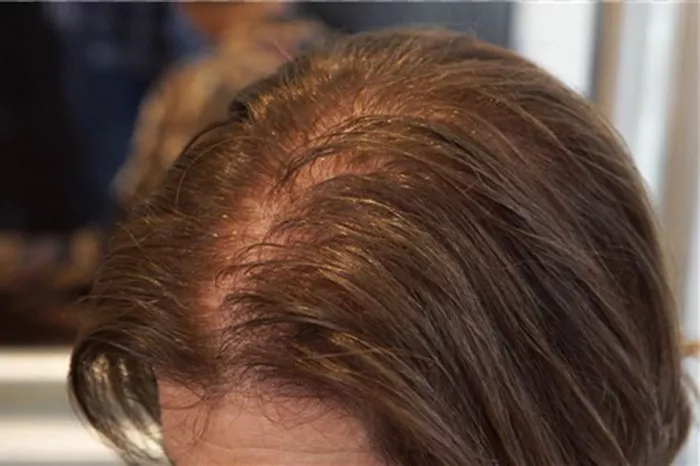Experiencing significant hair loss at the age of 14 can be both alarming and disconcerting. While it is relatively uncommon for teenagers to face excessive hair shedding, several factors may contribute to this phenomenon. This article aims to explore the potential reasons behind hair loss in teenagers and provide insights into possible solutions for those grappling with this concern.
Hormonal Changes: A Common Culprit
One of the primary reasons teenagers may experience hair loss is hormonal changes. Adolescence is marked by a surge in hormones, including androgens, which play a crucial role in the development of secondary sexual characteristics. Fluctuations in hormone levels can affect the hair growth cycle, leading to increased shedding. While hormonal changes are a natural part of puberty, some teens may be more genetically predisposed to sensitivity to these fluctuations, resulting in noticeable hair loss.
Nutritional Deficiencies: The Impact on Hair Health
Inadequate nutrition is a prevalent issue among teenagers, and it can significantly impact hair health. The teenage years are a critical period for growth and development, requiring a balanced intake of vitamins and minerals. A deficiency in essential nutrients such as iron, zinc, vitamin D, and biotin can contribute to hair loss. Ensuring a well-rounded and nutrient-rich diet is crucial for promoting overall health and preventing hair shedding.
Stress and Emotional Well-being: The Mind-Body Connection
The teenage years are often marked by academic pressures, social challenges, and emotional upheavals. High levels of stress, anxiety, or emotional distress can contribute to hair loss. The mind-body connection plays a pivotal role in hair health, and chronic stress can disrupt the normal hair growth cycle. Encouraging open communication and providing outlets for stress relief can be beneficial for teenagers experiencing hair loss due to emotional factors.
Traction Alopecia: Hairstyles and Hair Practices
Certain hairstyles and hair practices may contribute to hair loss in teenagers, a condition known as traction alopecia. Tight hairstyles, frequent use of hair extensions, and the constant pulling or tension on the hair follicles can lead to damage and shedding. Adolescents experimenting with different hairstyles may inadvertently contribute to hair loss. Promoting gentle hair care practices and avoiding styles that cause undue stress on the hair can help prevent traction alopecia.
Underlying Medical Conditions: Unraveling the Mystery
While uncommon, certain medical conditions can manifest as hair loss in teenagers. Conditions such as alopecia areata, thyroid disorders, and autoimmune diseases may affect the hair growth cycle. If a teenager is experiencing significant and unexplained hair loss, it is crucial to consult with a healthcare professional to rule out underlying medical conditions and determine an appropriate course of action.
Medication Side Effects: A Potential Factor
Some medications prescribed for various health conditions may have hair loss as a side effect. Adolescents taking medications for acne, hormonal imbalances, or other health issues should be aware of potential side effects related to hair loss. If there are concerns about medication-related hair shedding, consulting with a healthcare provider is essential to explore alternative options or adjust the dosage.
Genetic Predisposition: Family History Matters
Genetics play a significant role in hair health, and a family history of hair loss may contribute to a teenager’s experience of shedding. Androgenetic alopecia, commonly known as male or female pattern baldness, can manifest during the teenage years. Understanding the family’s history of hair loss can provide valuable insights into the genetic factors influencing a teenager’s hair health.
Poor Hair Care Habits: Impact on Scalp Health
In the quest for experimentation and self-expression, teenagers may adopt poor hair care habits. Overuse of heat styling tools, aggressive brushing, and harsh chemical treatments can damage the hair shaft and contribute to excessive shedding. Educating teenagers about the importance of gentle hair care practices and the potential consequences of harsh treatments can empower them to make informed choices for their hair health.
Seeking Professional Guidance: A Vital Step
If a teenager is experiencing significant hair loss, seeking professional guidance is paramount. A dermatologist or healthcare provider specializing in hair disorders can conduct a thorough examination, assess potential causes, and recommend an appropriate course of action. Identifying the root cause of hair loss is crucial for implementing targeted and effective interventions.
Building Healthy Habits: Solutions for Teen Hair Loss
Addressing hair loss in teenagers involves adopting a holistic approach that encompasses nutrition, stress management, and proper hair care. Encouraging a well-balanced diet rich in vitamins and minerals, promoting stress-relief techniques, and fostering healthy hair care practices can contribute to improved hair health. Additionally, professional treatments such as topical medications or low-level laser therapy may be recommended based on the underlying cause of hair loss.
See Also: Combating Hair Loss Caused by Dandruff: The Definitive Guide
Conclusion
While experiencing significant hair loss at 14 may raise concerns, understanding the potential reasons behind this phenomenon is essential for finding solutions. Hormonal changes, nutritional deficiencies, stress, and genetic factors can all contribute to hair shedding in teenagers. By addressing these factors and promoting healthy habits, teenagers can take proactive steps toward maintaining optimal hair health. Seeking professional guidance ensures a thorough assessment and personalized interventions, fostering confidence and well-being during these formative years.


